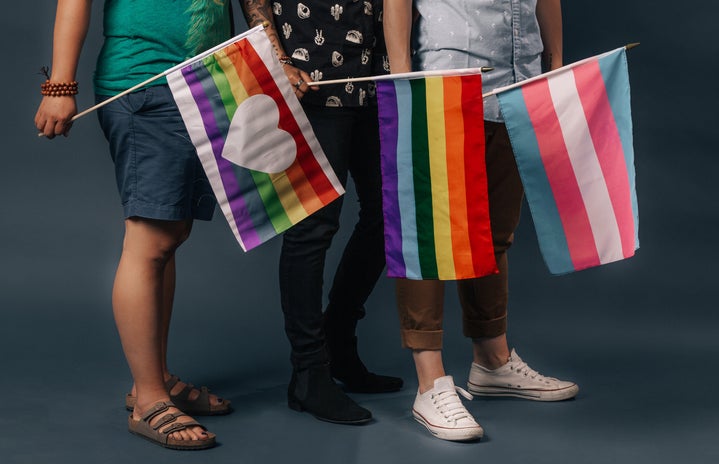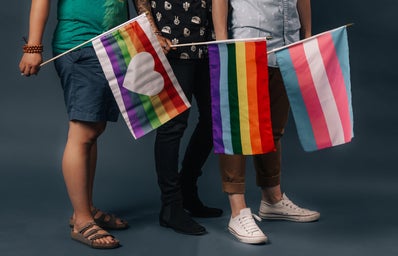While watching Transformers for the first time, I was introduced to Meghan Fox, a beautiful and talented woman, which had my little 12 year old heart racing.
This was my first realization that I was bisexual.
In the following years, I would come to then lock myself in my bathroom at my parents’ house, cry, and pray that I wasn’t attracted to women and that these feelings about finding women attractive were just false intrusions. I worried about what I would do and how the world would look at me if these feelings were real. I didn’t want to be different and I most definitely didn’t want to be seen as different.
My most distinct memory from before I came out is feeling like I had this huge secret that I constantly had to suppress further and further within myself until it became so small that it wasn’t real. Looking back on this, I ask myself why I had these feelings as my parents were liberal and accepting people and I considered myself to be an ally to the LGBTQ+ community.
Why is it that when some women are faced with questions about their sexuality they instinctively suppress it?
My Experience with Bisexuality: Conforming to Society’s Standards
A book my friends and I commonly refer to as our bible is Glennon Doyle’s Untamed, which discusses how women are supposed to perfectly fit into tiny categorical boxes like ‘skinny’ and ‘perfect’.
This is the same when it comes to women and their sexuality.
Women are expected to grow up, go to college, meet the perfect guy, and live the perfect life. If women struggle with mental health issues, question their sexuality, or fall into any other category that is not seen as ‘normal’, society disapproves and invalidates the different feelings and experiences. As a result, women exploring their sexuality feel as though they longer fit in those boxes.

Being bisexual, I find myself unable to conform to society’s standards and I began to seek a form of unachievable validation. People around me always expect me to be in a relationship with a man, and when a man is removed from the idea of a relationship, people begin to question, create assumptions, and invalidate. This is why, more often than not, the phrase “who is the man in the relationship” or “who wears the pants” is heard by women in same-sex relationships. Common assumptions are always brought up like, “you will end up with a man” or “you’re just experimenting.” When a relationship does not include a man, he is inserted into a relationship by hypothetical means.
My struggle with conforming to society’s standards is nothing new. Growing up I thought people could either be straight, gay, or lesbian; and when I had crushes on girls I thought that I must be lesbian. When I had crushes on boys as well, I confused myself even more. It wasn’t until I was a freshman in high school that I discovered the word ‘bisexual.’
No one tells us that sexuality is a spectrum and that we can exist in multiple spaces of sexuality, choosing whether or not to label ourselves entirely.
Society puts pressure on everyone to apply individual labels, stemming from the need to fit into boxes. Some people cannot just fit into the blanket terms of ‘gay’ or ‘straight.’ The refusal to fit under a preconceived label immediately confuses these standards.
The Sexualization of Women Loving Women
In addition to conforming to blanket standards, same-sex relationships are often oversexualized to compensate for misconceptions about the LGBTQ+ community. Women in same-sex relationships are oversexualized through porn, media exposure, and the general idea that they solely exist for male pleasure. This takes form in movies of women kissing for attention at parties as well as women engaging in sexual relations for the sole purpose of pleasing men in porn.
The culture of over-sexualization that we are exposed to, even since childhood, creates a taboo narrative about women in same-sex relationships. Even now, as I hold my girlfriend’s hand or kiss her in public, I am reminded of how my relationship is still oversexualized by the many strange and inquisitive looks I receive from people passing by. I am reminded that being with a woman is still seen as something that happens solely for men in private and not for ourselves all the time.
Women in relationships with other women, that do not exist for male pleasure, fail to fit in the tiny box that society has created for us.
Society creates these boxes and for each bisexual woman, including myself, and each experience with these boxes is different. We are told, not by words, but by our lived experiences, that our lives will be easier if we remain in our box. As a result, bisexual women sometimes feel the need to exist within these parameters and daring to step outside of them to face society’s marginalization is a feeling no one should have to constantly endure.


